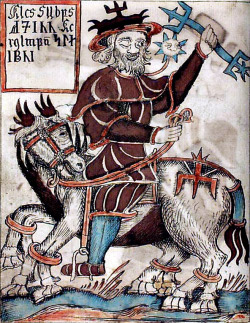
I'VE BEEN MULLING Christmas over, lately.
All over the world, people are feasting, gifting, sharing, and it seems like a good time to contemplate the meaning of it all.
When I was a teenage fundamentalist, I believed that meaning was about words, and that the "true" meaning of a word was to be found in its history and roots.
If you approach "Christmas" that way, it's a ceremony in the Roman Catholic Church. A "mass" dedicated to "Christ".
Even a fundamentalist knows Christmas is more than that. Even a Baptist from the bible belt knows that the word applies to Baptists as well as to Catholics, and that it includes family times, and gift-giving, and Santa Claus, and decorated trees.
That's not only because the meaning of a word is bigger than its history. It's also because the thing itself—the day, the season, the idea—is bigger than the name.
This celebration, this season, has been kept by humans all over the globe, in many cultures and by many names, as far back as we can trace—certainly further back than Christianity and the name it now bears.
The celebration is focused on the winter solstice: the shortest day in the year. Almost every religion recognizes the season near that date in some way. It's an intrinsic part of our common human heritage, our common human spiritual tradition.
Stonhenge was designed to point toward the sunset on this day.
The seventh-century Japanese sun-goddess emerged from her cave on this day, and the sun goddess of Finland, Sweden, and Norway flies through the sky on a device made of reindeer bones.
In classical Greece, a baby was presented, symbolizing the rebirth of Dionysus, and the priests changed water into wine.
Hindus fly kites, and give gifts of candy. The Norse burned Yule logs to honor Thor. Early Germans honored the goddess Hertha by exchanging gifts and decorating the house with evergreens.
Our own customs are a mix of these and others—a participation, at this time and place, in a celebration that is native to all humanity and larger than any one culture or religion.
There is a bit of a war on Christmas these days, though it shouldn't be taken too seriously. The occasional Grinch, or Scrooge, or O'Rielly, would like to limit its celebration to their own sect or tribe, and get the government to force a single "meaning" on us all.
But the holiday is too large for that, and will continue to mean what it does: the opportunity to find the perfect gift for Uncle Leonard, the excuse to renew community with family and friends, Rudolph, Chestnuts on an open fire, Dad's special scrambled eggs, kissing under the mistletoe, and, behind it all, the knowledge that, although the coldest months still lie ahead, the sun has already begun its journey back toward Spring.






